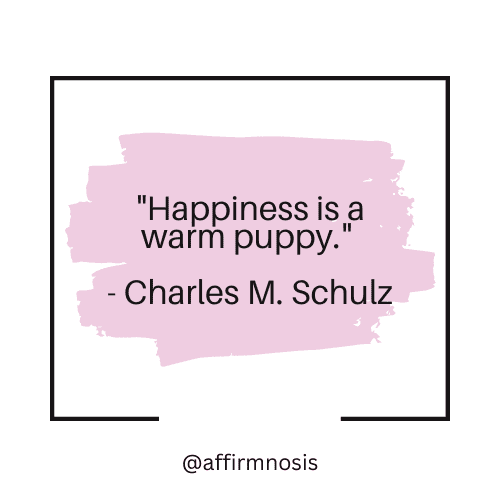In today’s fast-paced and stressful world, it’s easy to get caught up in negative thoughts and emotions. We often forget to take a step back and focus on our own well-being. One way to combat this is through the use of happiness affirmations, which are positive statements that promote feelings of joy, gratitude, and contentment.
Explanation of Happiness Affirmations
Happiness affirmations are simple statements that you repeat to yourself regularly as a way to rewire your brain for positivity. These statements can be anything from “I am worthy of love” to “I am successful in all areas of my life.” The key is that they need to be positive, present tense statements that reflect what you want in your life. Affirmations work by creating new neural pathways in the brain.
When we repeat these positive statements consistently over time, we start to believe them as true. This helps us shift our perspective from negative self-talk to positive self-talk.
Importance of Positive Self-Talk
The way we speak to ourselves has a huge impact on our mental health and well-being. Negative self-talk can lead to feelings of anxiety, depression, and low self-esteem. On the other hand, positive self-talk can help increase confidence, reduce stress levels, and improve overall happiness.
Happiness affirmations are a powerful tool for promoting positive self-talk because they give us something uplifting and encouraging to focus on throughout the day. By replacing negative thoughts with positive ones, we can train our minds to think more optimistically about ourselves and our lives.
Benefits of Incorporating Happiness Affirmations into Daily Routine
There are many benefits associated with incorporating happiness affirmations into your daily routine. For starters, they can help increase feelings of self-worth and confidence. When we believe in ourselves and our abilities, we’re more likely to take risks and pursue our goals with enthusiasm.
In addition, happiness affirmations can also help reduce stress levels by promoting a sense of calm and relaxation. When we’re feeling overwhelmed or anxious, repeating a positive statement to ourselves can provide a much-needed moment of peace.
Perhaps most importantly, happiness affirmations have been shown to improve overall well-being by increasing feelings of gratitude and contentment. By focusing on the good things in our lives, we can cultivate a mindset of abundance and positivity that helps us navigate even the toughest of times.
High-level Overview of Happiness Affirmations
Definition and purpose of affirmations
Affirmations are positive statements that are aimed at reinforcing a desired belief or behavior. They are tools used to reprogram the subconscious mind by replacing negative self-talk with positive ones. The purpose of affirmations is to create a sense of empowerment, positivity, and self-belief, which can inspire individuals to take action towards achieving their goals.
How affirmations work to rewire the brain for positivity
Affirmations work by changing the neural pathways in the brain. When repeated over time, they influence our thinking patterns and beliefs about ourselves and the world around us.
The brain is highly adaptable and has what neuroscientists call “neuroplasticity”, which means it can change its structure and function in response to experiences, thoughts, and emotions. When we consistently use positive affirmations, we stimulate the production of feel-good hormones like serotonin and dopamine.
These chemicals promote feelings of happiness, pleasure, and well-being. Positive affirmations also help create new neural connections in our brains that reinforce positive thinking patterns while weakening negative ones.
Examples of general happiness affirmations
Here are some examples of general happiness affirmations that you can use: – I am worthy of love and happiness
– I choose to focus on the good in my life – I trust that everything happens for a reason
– I attract positivity into my life effortlessly – Every day brings new opportunities for joy
These statements may seem simplistic at first glance but repeating them regularly can have a profound impact on your mindset. Remember that there is no limit to how many different affirmation statements you can create; as long as they encourage positivity or empower you towards your goals they will all be effective.

The Power Of Repetition And Consistency
Affirmations work best when repeated consistently. Practicing them every day can have a cumulative impact, helping to rewire the brain for positivity over time.
It is important to be patient and persistent with affirmations, as results will not always be immediate. To make affirmations more effective, it is important to practice them regularly at specific times during the day.
This could be in the morning before starting work, during breaks throughout the day or just before bed. Consistent practice helps you to cultivate your positive self-talk and make it a natural part of your daily routine.
Affirmations are powerful tools that can help us achieve happiness by rewiring our brains for positivity. By using positive statements to reinforce our desired beliefs and behaviors, we can cultivate a more empowering and constructive mindset that supports us towards achieving our goals. Remember that repetition and consistency are key to making affirmations effective in reprogramming your subconscious mind towards happiness and fulfillment.
Specific Affirmations for Different Areas of Life
When it comes to creating happiness affirmations, it’s important to tailor them to specific areas of life. This allows for a more targeted approach and can help individuals achieve their goals more effectively.
Some examples of specific affirmations include: – Career: “I am successful in my career and continue to make progress towards my goals.”
– Relationships: “I am surrounded by positive, uplifting people who support me in all aspects of life.” – Health: “I prioritize my health and well-being by making healthy choices every day.”
By focusing on specific areas of life, individuals can create a more personalized approach to their affirmation practice. This helps them stay motivated and focused on achieving their goals.
Tailoring Affirmations to Individual Needs and Goals
In addition to focusing on specific areas of life, it’s also important to tailor affirmations to individual needs and goals. This means creating statements that are meaningful and relevant to your personal journey.
Here are some tips for tailoring affirmations: – Use first-person language: Instead of saying “you”, use “I” or “me” so that the affirmation feels more personal.
– Keep it present tense: Use words like “am” or “have” instead of future tense verbs. – Make it positive: Focus on what you want rather than what you don’t want.
– Be specific: Create statements that are clear and concise. By tailoring affirmations to individual needs and goals, individuals can create a practice that is tailored specifically for them.
Incorporating Visualization Techniques with Affirmations
Visualization is a powerful tool when it comes to creating happiness affirmations. This involves picturing yourself achieving your desired outcome while reciting your affirmation statement. Here are some tips for incorporating visualization techniques:
– Create a mental picture: Imagine yourself achieving your desired outcome in vivid detail. – Use positive emotions: Combine your mental picture with feelings of joy and gratitude.
– Repeat often: Practice visualization regularly to reinforce the positive emotions associated with it. By incorporating visualization techniques, individuals can create a more powerful affirmation practice that helps them achieve their goals more effectively.
Incorporating happiness affirmations into daily routine can have numerous benefits. By focusing on specific areas of life and tailoring affirmations to individual needs and goals, individuals can create a practice that is meaningful and effective.
Visualization techniques also provide an additional tool for enhancing the power of affirmations. With consistent practice and dedication, happiness affirmations can help individuals achieve their desired outcomes and live a happier, more fulfilling life.
The Science behind How Positive Self-Talk Affects the Brain
The concept of happiness affirmations is based on the idea that our thoughts and emotions are closely linked. Our thoughts, whether positive or negative, can affect our emotions and behavior.
When we think positively, our brain releases neurotransmitters such as serotonin and dopamine which are linked to feelings of happiness and well-being. Conversely, when we focus on negative thoughts, stress hormones such as cortisol are released which can have harmful effects on both our physical and mental health.
Studies have shown that practicing positive self-talk through affirmations can help rewire the brain for positivity. This happens because affirmations help to create new neural pathways in the brain that reinforce positive beliefs and attitudes.
Regular practice of positive self-talk has been shown to improve mood, reduce stress levels, and even boost cognitive function. Moreover, research has also found that positive self-talk can lead to physical changes in the brain.
Studies using MRI scans have shown that certain areas of the brain associated with emotional processing become more active when people engage in positive self-talk. This suggests that engaging in regular affirmations can help change how our brains process emotional information.
The Importance of Using Present Tense in Affirmation Statements
When creating affirmation statements, it is important to use present tense rather than future tense. This is because present tense statements make it easier for the brain to believe them to be true in the moment rather than at some point in the future.
Using present tense also helps us focus on what we want right now rather than what we hope will happen later. For example, instead of saying “I will be happy someday,” say “I am happy now.” The latter statement reinforces a feeling of happiness as something you have already achieved rather than something you hope will happen someday.
Tips for Creating Effective and Personalized Affirmation Statements
Creating personalized affirmation statements is important because it helps to make the affirmations feel more meaningful and relevant to your life. Here are some tips for creating effective and personalized affirmation statements:
1. Use positive language: Affirmations should always be stated in a positive way. Instead of saying “I am not unhappy,” say “I am happy.”
2. Be specific: Make sure your affirmation statement is specific to the situation or area of life you want to focus on. For example, instead of saying “I have good relationships,” say “My relationships are positive and fulfilling.”
3. Use strong emotional language: The more emotionally charged the affirmation, the more powerful it will be in reinforcing positive beliefs and attitudes. 4. Word affirmations in a way that resonates with you: It is important that you feel comfortable with the wording of your affirmation statement, so take time to find phrasing that feels authentic and true to yourself.
Incorporating happiness affirmations into daily routine can lead to significant improvements in overall well-being and happiness levels. Understanding how affirmations work on a neurological level can help us appreciate their power even more.
Remembering to use present tense when creating affirmation statements keeps them grounded in the present moment, making them easier for our brains to accept as true. By following these tips for creating effective and personalized affirmations statements, we can make this practice even more impactful on our lives by ensuring they resonate with us at a personal level while still maintaining its essence of positivity and hopefulness.
Conclusion
Recap on the Benefits and Importance of Happiness Affirmations
Incorporating happiness affirmations into daily routine can be a powerful tool for rewiring the brain for positivity. Positive self-talk helps boost confidence, build resilience, and improve overall well-being.
By repeating affirmations that resonate with individual needs and goals, one can begin to shift their mindset towards a more positive outlook on life. This not only improves mental health but physical health as well.
Encouragement to Incorporate them into Daily Routine
Although incorporating happiness affirmations into daily routine may seem daunting at first, it is important to start small and stay consistent. Consider incorporating them into morning or bedtime routines or repeating them during moments of stress or anxiety. It only takes a few minutes each day to make a big impact on overall well-being.
Final Thoughts on the Power of Positive Self-Talk
The power of positive self-talk cannot be overstated. By using affirmations regularly, individuals can begin to transform their thoughts and beliefs about themselves and the world around them. Eventually, these new thought patterns become habits that shape their lives in profoundly positive ways.
Happiness affirmations are a simple yet effective way to rewire the brain for positivity and improve overall well-being. By tailoring affirmations to individual needs and goals, using present tense language during affirmation statements, visualizing desired outcomes while reciting affirmations, anyone can start benefiting from this technique almost immediately with little effort required beyond consistency in practice over time.
Quotes from notable individuals on happiness:
- “Happiness is not something ready-made. It comes from your own actions.” – Dalai Lama
- “The purpose of our lives is to be happy.” – Dalai Lama
- “Happiness is when what you think, what you say, and what you do are in harmony.” – Mahatma Gandhi
- “The greatest happiness you can have is knowing that you do not necessarily require happiness.” – William Saroyan
- “Happiness is not a goal; it is a by-product.” – Eleanor Roosevelt
- “Happiness is a direction, not a place.” – Sydney J. Harris
- “The secret of happiness is not in doing what one likes, but in liking what one does.” – James M. Barrie
- “Happiness is not the absence of problems, it’s the ability to deal with them.” – Steve Maraboli
- “Happiness is a choice. You can choose to be happy. There’s going to be stress in life, but it’s your choice whether you let it affect you or not.” – Valerie Bertinelli
- “The only thing that will make you happy is being happy with who you are, and not who people think you are.” – Goldie Hawn
- “Happiness is not something you postpone for the future; it is something you design for the present.” – Jim Rohn
- “Happiness is the secret to all beauty. There is no beauty without happiness.” – Christian Dior
- “Happiness is the meaning and the purpose of life, the whole aim and end of human existence.” – Aristotle
- “Happiness is not a station you arrive at, but a manner of traveling.” – Margaret Lee Runbeck
- “Happiness is the best makeup.” – Drew Barrymore
- “Happiness is not in the mere possession of money; it lies in the joy of achievement, in the thrill of creative effort.” – Franklin D. Roosevelt
- “Happiness is a butterfly, which when pursued, is always just beyond your grasp, but which, if you will sit down quietly, may alight upon you.” – Nathaniel Hawthorne
- “Happiness is not something you postpone for the future; it is something you design for the present.” – Jim Rohn
- “Happiness is a warm puppy.” – Charles M. Schulz
- “Happiness often sneaks in through a door you didn’t know you left open.” – John Barrymore
These quotes emphasize different aspects of happiness, including acceptance, harmony, and the power of choice.




























































